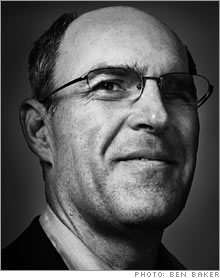|
A big year for buyouts The smart money and smart people behind the private-equity boom.
(Fortune Magazine) -- Hardly a day goes by without another marquee-name public company being bought out by one of Wall Street's private-equity goliaths. You've seen the headlines: HCA (Charts), Harrah's (Charts), Albertson's (Charts) - they're just a few of the big names in the cross hairs. By any measure this trend is gaining momentum. Four of the five biggest announced buyouts in history have gone down this year (No. 1 is still RJR in 1988, according to Dealogic). As stock market returns have drooped in this decade, institutional investors have jacked up their allocation to what is known as "alternative investments" (read hedge funds and buyout funds).
No wonder the likes of KKR, Carlyle Group, Bain, Texas Pacific and others are able to raise huger and huger funds - the most recent superlative being Blackstone's $15.6 billion (Olympic-sized) pool. It is almost certain to be a record-breaking year for the buyout masters: Through September, U.S. private-equity firms had raised $172.2 billion, just a tad under the $177.9 billion they amassed in 2000. (This according to the monthly Private Equity Analyst - a must-read these days.) And in another sign that private equity has gotten powerful - perhaps too powerful - the Justice Department is said to be looking at possible anticompetitive behavior in the industry. And then there's the flood of human capital into the world of private equity. Former Treasury Secretary Paul O'Neill, former SEC head Arthur Levitt, Jack Welch, Mickey Drexler, Jacques Nasser, Lou Gerstner and my old boss, former Time Inc. editor-in-chief Norm Pearlstine, are all in the swim. So I wasn't surprised when I saw the other day that Michael Capellas - the former head of Compaq and MCI - had signed up to work at Silver Lake Partners, the bigtime high-tech buyout firm. Talking to Capellas, you can tell what appeals to him is that this game is no longer about rescuing wheezing, middle-market Rustbelt companies. "First off, the scale of this business has gotten such that Silver Lake and others can look at world-class companies," Capellas said to me on the phone. "Now instead of turnarounds we are looking more at companies that maybe need funding to drive growth, like accelerating R&D." I got the feeling that Capellas already had some big-game candidates in mind. Henry McVey of Morgan Stanley has a list of possible mega-buyout targets that includes EMC (Charts), Texas Instruments (Charts) and even Dell (Charts). It got me wondering where all this was headed. Seems like buyout firms are creating a private-company parallel universe - one that is beholden to an altogether separate body of law, and conceivably a distinct code of conduct. Not long ago I had dinner with Paul Danos, dean of the Tuck School of Business at Dartmouth, and we talked about this very issue. "Going private is very top-of-mind with corporate directors these days," said Danos, who's on the board of General Mills. The private-equity guys, says Danos, like to argue that if one company in an industry goes private, it gains advantages, and others in the industry may feel compelled to follow suit. What kind of advantages? Well, not just relief from some regulatory burdens, according to both Capellas and Danos, but more important, freedom from the relentless quarterly-earnings grind. "In a private company you can focus on what really matters," says Capellas. "Customers and products are the focus, not administration." So are we moving toward a day when private equity dominates huge swaths of our economy? Probably not, for the simple reason that the touchdown event for any buyout fund is getting the investors' money out, which usually entails taking the company public again. We have seen huge IPOs or re-IPOs this year from Burger King and J. Crew, with Hertz on deck. And eventually the great private-equity upcycle will play itself out. Which to me highlights a more front-and-center worry. Right now there's oodles of money chasing what has to be diminishing returns at some point. According to Thomson Financial, buyout funds averaged gains of 25.5 percent for the year ended March 31 and 17.6 percent for the past three years. How long will that last? I can give you a precise answer: not forever. Andy Serwer, senior editor-at-large of Fortune, can be reached at aserwer@fortunemail.com. Watch him on CNN's "American Morning" and "In the Money." _____________________________ |
|

